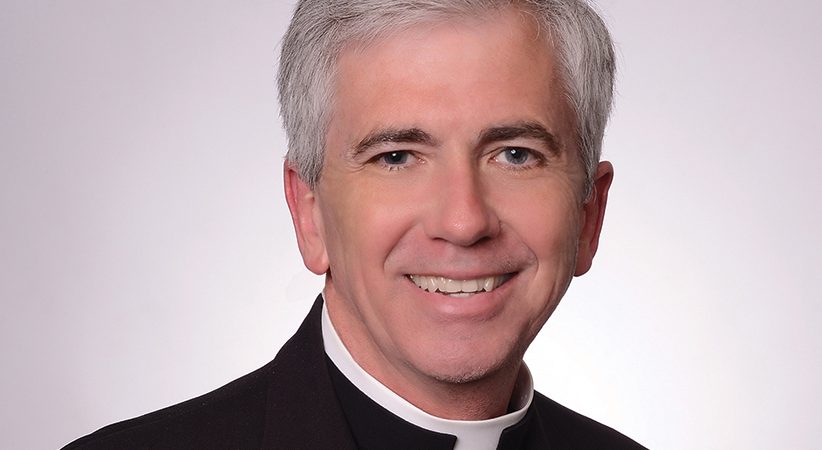Principles of Pastoral Care
Tips and keys for successful ministry
Msgr. Michael Heintz Comments Off on Principles of Pastoral Care
 With the advent of another school year, I thought in this column I would share some pastoral principles I use with the class of transitional deacons at Mount St. Mary’s Seminary, where I teach. These are the product of lots of experience — successes and mistakes — and the fruit of conversations with my brother priests through the years. They are not exhaustive; nor are they meant to be infallible. They are ever in flux — being tweaked and added to. But from the for-what-it’s-worth department I thought it might be of value to share them:
With the advent of another school year, I thought in this column I would share some pastoral principles I use with the class of transitional deacons at Mount St. Mary’s Seminary, where I teach. These are the product of lots of experience — successes and mistakes — and the fruit of conversations with my brother priests through the years. They are not exhaustive; nor are they meant to be infallible. They are ever in flux — being tweaked and added to. But from the for-what-it’s-worth department I thought it might be of value to share them:
1. The aim of all pastoral care is the salus animarum; it is the heart of the Church’s pastoral mission and, according to the code, it remains its suprema lex.
2. In the economy of the Kingdom, one man sows and another reaps (cf. Jn 4.37) — that is, only infrequently will we see the fruits of our labors. Thus, when you sow, pray for the one who will, in the cunning of Divine Providence, reap; and when you reap, remember to pray for the one who had sown.
3. A key element in communication is not merely what is communicated or even how it is communicated (both are important) but rather how it is received. This demands attentiveness to the hearer; this is true both in preaching and in one-on-one pastoral counsel. Further, when someone asks a question in conversation, pay attention to the “question behind the question,” whether conscious (but unarticulated) or unconscious.
4. In many tough pastoral cases, the law of gradualism is perhaps the most prudent approach (think of Gregory the Great’s advice to Abbot Mellitus: “by stages and step by step, not by leaps and bounds”). People grow into the teaching of the Church; people grow into their baptismal vocation to holiness; couples grow into their marital vocation; people grow into their priestly or religious vocation.
5. Trust the Church’s wisdom. There’s a reason that the ragtag gaggle of bunglers into which, by orders, we have been co-opted has, for 2,000 years, been the instrument of God’s saving work in the world. But in order to trust that wisdom, we must first know that wisdom. And we always have more to learn. So, read. And when you’re done, read something else. Oh, and then pick something else up to read. Repeat.
6. More important than effectiveness or success (worldly categories derived from business and sports) is fruitfulness (the category of the Kingdom).
7. Work hard to “bracket” yourself. Riddled with the effects of original sin, our instinctive, go-to move is immediately and unreflectively to look to ourselves and to extrapolate from our own experience; this can be especially true in our preaching. In pastoral care, it is most helpful to preempt this move and consciously to “bracket” oneself in attending to the needs of others. It’s not about us.
8. While prayer itself does not necessarily make one instantly fruitful in pastoral care, there is absolutely no doubt that without prayer we simply cannot be pastorally fruitful.
9. Work to build a culture of gratitude and affirmation among your people and within your pastoral staff. If you do this, when you need to give the hard saying or correct or admonish someone, they will be better disposed to receive it, because it is coming from a place of fatherly love.
10. When considering a pastoral venture, plan or project, ask yourself, “Whose needs are being met by this?” While we all have needs, make sure that it’s not principally your needs that are being met by it. Also, note the corollary: Beware of fostering and feeding in yourself the “need to be needed.” Our task is to help folks grow in freedom (= in Christ), not to foster greater dependence upon us.
11. From time to time, when you preach the Gospel, people will walk away. Sometimes it’s because you’re speaking the truth; at other times, it’s because you’re being a jerk. Don’t confuse the latter for the former. Remember: it’s veritas in caritate.
12. Keep (and manage carefully) your calendar. Time management is essential to fruitful ministry and your personal well-being.
13. Build into your calendar both your prayer time and relaxation/exercise each day; try to build the rest of your day around them (in periculo mortis situations, however, always trump even prayer).
14. Visibility. Visibility. Visibility. Be present. At the parish office; at every Sunday Mass; at the grade school/CCD; at the hospital and nursing home.
15. Show up; smile; work hard; be kind to people. If you do these four things (presuming, of course, doctrinal orthodoxy and a serious life of prayer), you will be fruitful in ministry. Period.
MSGR. MICHAEL HEINTZ, a priest of the Diocese of Fort Wayne-South Bend, serves as academic dean and director of intellectual formation at Mount St. Mary’s Seminary in Emmitsburg, Maryland.





